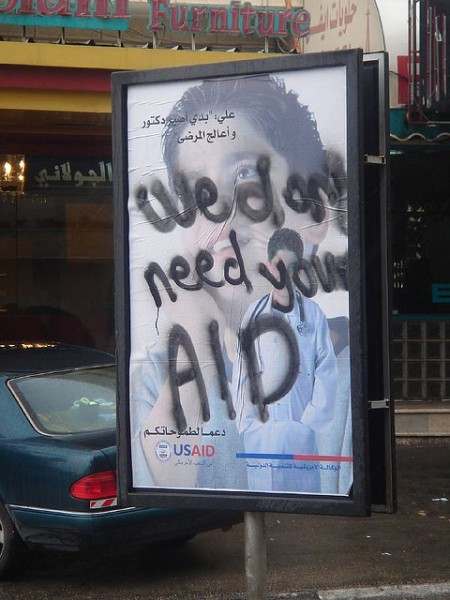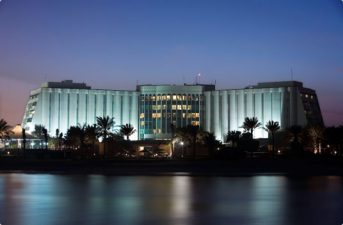 USAID billboard in Ramallah graffiti-ed with words “We Don’t Need Your Aid” but according to latest World Bank report, growth in the West Bank and Gaza is dependent on aid donors.
USAID billboard in Ramallah graffiti-ed with words “We Don’t Need Your Aid” but according to latest World Bank report, growth in the West Bank and Gaza is dependent on aid donors.
A stroll around the West Bank is likely to bring you face to face with a project supported by America’s aid agency USAID pretty quickly. The posters and signs seems to be everywhere and although the fragile economies of the West Bank and Gaza are finally showing some signs of growth and development, the question remains: how sustainable can growth funded by aid donors really be?
Well, according to the latest report by the World Bank, not very. The organisation said that the Palestinian economy’s growth isn’t likely to be sustainable as it is largely driven by donor donations, and that it will not be sustainable unless Israeli restrictions are removed. The World Bank report explained that “Aid is what keeps many Palestinians above the poverty line, particularly in Gaza, where unemployment is still 37.4 percent, and a staggering 71 percent of the population benefited from some form of social assistance in 2009.”
The World Bank reported that there has been some impressive progress in the West Bank and Gaza such as improvements in the health and education sector. It also estimated that the Palestinian economy had expanded 9.3 percent last year.
(I feel I should point out that sustainable growth according to the World Bank doesn’t mean green and clean development which won’t destroy the planet but rather the sustained growth of an economy without much regard for the impact it has on the environment.)
The role that Israel plays in the progress of the Palestinian economy was also highlighted by the World Bank report. They pointed out that the recent easing of restrictions by Israel had played a positive role in the economic growth in the West Bank and Gaza. Israel has recently removed several roadblocks in the West Bank and eased restrictions on imports into Gaza whilst retaining its restrictions on exports from the Hamas-controlled Gaza Strip.
“Ultimately, sustainable economic growth in the West Bank and Gaza can only be underpinned by a vibrant private sector,” the World Bank said. “The latter will not rebound while Israeli restrictions on access to natural resources and markets remain in place.”
Earlier this week, the International Monetary Fund (IMF) also reported improvements in the Palestinian financial situation and supported the Palestinian Authorities’ bid for global recognition of its statehood. According to reporting by Reuters, Prime Minister Salam Fayyad, will present facts and figures to show how the Palestinian Authority has used hundreds of millions of dollars in foreign assistance over the past two years to create justice, education, energy, health, water, security and housing services.
:: Image via dilsbona on flickr.
:: Bloomberg
For more on the West Bank see:
Israel Considers Building An Artificial Island Off Gaza Coast
Palestine’s Green City Tackles Water and Wastewater Management
A Whirlwind Guide to Palestinian Guesthouses


